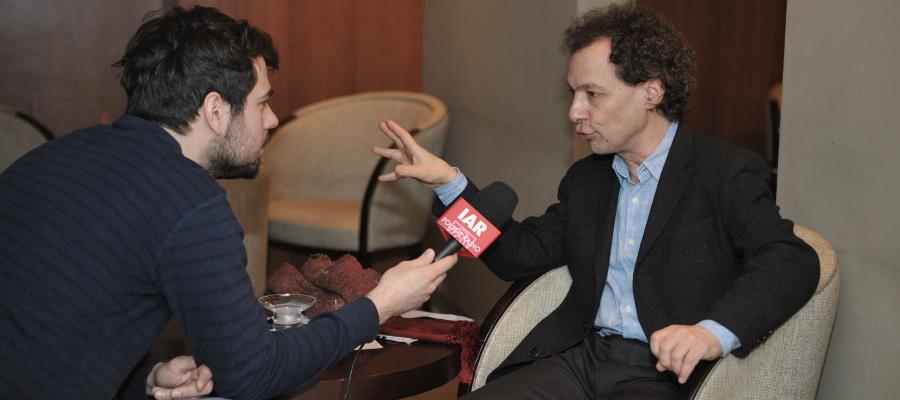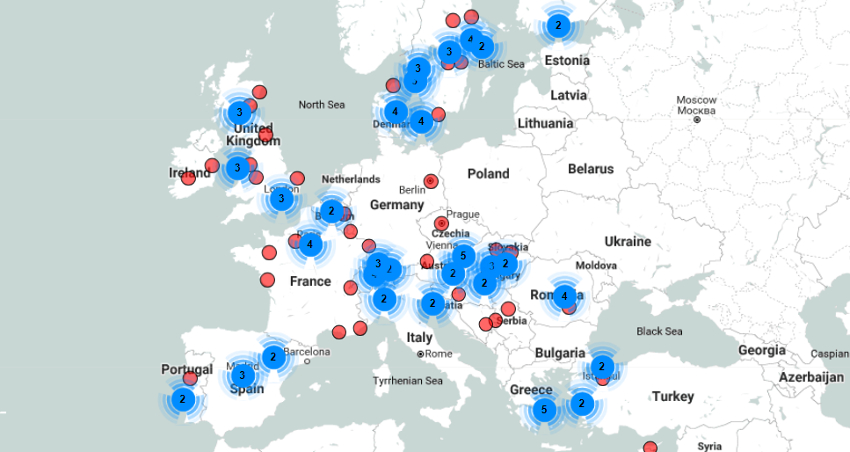
Sistema Europe President Marshall Marcus talks to Polskie Radio
Marshall Marcus looks back at the origins of Sistema Europe
I’d like to dwell for a moment on authenticity. It is July 2006 and I am having breakfast at the Alba Hotel in Caracas with Maestro Abreu. The discussion is lively and one aspect of substance that we alight on is Europe and El Sistema. Maestro Abreu is talking (with his usual prescience) about the idea of there being Sistema-inspired programmes in Europe. He is, now that I look back at it, pointing me somewhere. A little bit slow, it takes me a few years to catch up. About half a decade later, I begin to understand that not only is El Sistema-inspired activity now actually happening in European countries (Scotland, England, Italy, Portugal and Sweden for starters) but that it could also be a really useful service to bring these projects together in some form of supportive network. So it is that on 30th July 2011, almost on a whim and not really knowing exactly where it will lead, I buy the website domain sistemaeurope.org.
Yet, it is only in the early hours of 2nd February 2012 - just after the second Take a Stand symposium has finished in Los Angeles, a world away from Europe - that I finally realise what it is that I have to do. I sit down in my L.A. hotel room, log on to the hitherto-unused sistemaeurope.org domain and write to as many relevant people in Europe that I can think of, with the news that a European network for Sistema-inspired programmes is launching. And, bang! It is happening.
Seven years later, in 2019, we have dozens of network member programmes covering much of Europe. From the Arctic to the Mediterranean, from the Atlantic to the Black Sea, thousands upon thousands of young people from a huge variety of cultures are part of a network with over 125 network centres in 26 countries.

Sistema-inspired programmes exist throughout Europe and you can find an extensive list of programmes on our members page
One big family
Despite its size, the network is still more of a big family than a grown-up organisation, yet that is how the Sistema-inspired programmes in Europe like it. It’s true that a few years ago we became a legal entity with an elected board and the usual rules and annual meetings, but, whilst our political masters in Brussels have constructed the quite staggering bureaucratic entity known as the EU, we prefer to act as a simple servant organisation, protecting – more than anything else – the set of ideals from Venezuela that brought us here in the first place.
In Europe we have the advantage of having a large number of cultures in a small regional space, with more than 40 countries packed into a land mass significantly smaller than Russia or Canada. And, maybe that’s part of the reason for the diversity of Sistema-inspired practice that seems to be our hallmark: Big Noise Scotland’s impressive teacher conferences; Italy’s notable federal structure; Sweden’s fantastic Side by Side project; England’s innovatory Young Leaders programme; the indescribable marvel that is the Turkish Music for Peace Foundation; refugee projects in Germany, Greece and Sweden; Superar’s fast-spreading franchise in Austria, Switzerland, the Balkans and beyond; Srebrenica’s House of Good Tones project; deeply committed orchestras from Portugal to Finland.
Sistema Europe Youth Orchestra - the story so far
Perhaps the most striking initiative in Europe to date has been the summer Sistema Europe Youth Orchestra (SEYO) camp that brings so much of this kaleidoscopic ingenuity and downright riotous enjoyment together. In 2013, young Sistema musicians rehearsed in the Vienna Boys Choir's swimming pool, such were the overflow (!) numbers involved. In 2015, Milan’s Expo and the famed La Scala opera house were host to 200 young musicians from 27 countries, including several Venezuelan orchestras. In 2017, an audience of several thousand filled the Herodes Atticus amphitheatre to watch a full moon rise over Athens’ famed Acropolis whilst listening to several hundred musicians, including a refugee camp choir and one of the world’s most wonderful divas. And, in 2018 in London and Birmingham, SEYO was given centre stage and free reign in two of the world’s greatest concert halls.
Photos from diverse SEYOs
Photos courtesy of Ivan Gonzalez (England), Diego Ravetti (Istanbul), Marco Caselli Nirmal (Milan) & Angel Ballesteros (Athens)
Use the arrows to scan the gallery
Along the way, music has been made not only in concerts but also in striking and (for El Sistema) new music-making spaces: SEYO has seen everything from flash mobs to empathy games, improvisation, music visualisation sessions and workshops on pop and baroque dance. Europe, it seems, is not just a venerable museum.
Of course, we have our challenges, and they are not just financial: it sometimes seems impossible to get information on all of the programmes, our website is still waiting for an effective members area and without the help of the Hilti Foundation we would be in a far more challenging place. On occasion, we have had to deal with internal national squabbles, one of which amounted to a miniature trademark war and the prospect of a court battle (which, thankfully, was averted). And, now that we have Sistema Europe in all its glory, we also have to work out who owns and can use Sistema Europe’s increasingly valuable brand.
A complex, collective creature
So, in Europe, we are (in no particular order) friendly, visionary, chaotic, complex, innovative, unresolved and deeply aspirational. Our approach puts me in mind of some words from Neil Ascherson, writing in the London Review of Books the month after Sistema Europe was founded:
My own sense of the Europe we have is that it’s like a sponge, a living sponge of squashy texture and uncertain outline, a rich and beautiful collective creature, into whose open pores countless visiting organisms swim or stay to breed ... [and not] a clanking metallic superstate.
And, that is the point really. When Maestro Abreu offered me his thoughts about El Sistema and Europe in 2006, he was simply doing what he did with everyone from outside of Venezuela, saying, in essence, you know your own culture, you know your own needs: take El Sistema and use it as you wish, according to your understanding of your own place.
That seems to me as good a starting point as any for a network of El Sistema-inspired work outside of Venezuela. Me: I am a European, I always have been and I always will be. But, whoever and wherever you are, my view is, never neglect the challenge of keeping the pulsating ideals and creative fire of your culture at the very heart of your work. Never sell out to process and convention. Let’s be Sistema-inspired, but let’s also never forget to be true to our own visions. Then, the work we do will really be authentic.
Marshall Marcus, Founder & President of Sistema Europe, March 2019
(Adapted from an article written for the first edition of the World Ensemble)